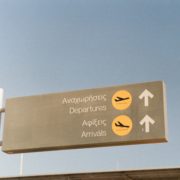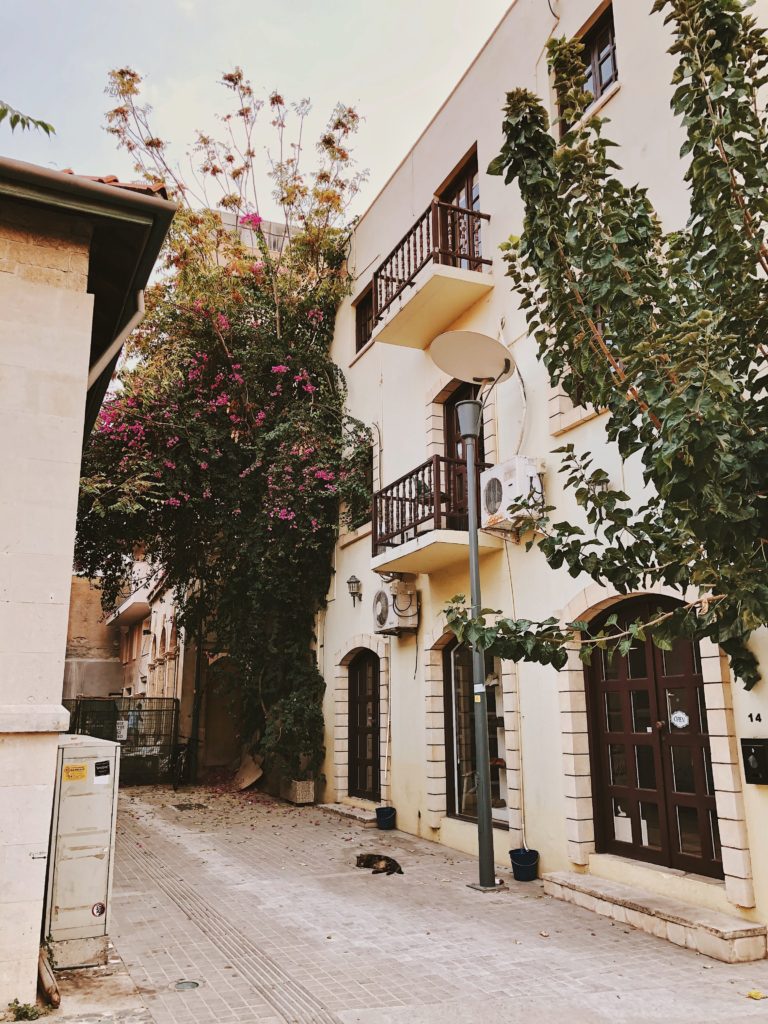‘Where are you from?’ – Why I love this question

Contribution by Zoë Andrea-Lykourgou.
‘So, where are you from?’
It’s a question that I’m sure virtually all of us have been asked at some point. It’s innocuous enough, and probably one of the first things you ask upon meeting someone new.
And yet I find that for many people, and particularly those whose heritage is from a country other than the UK, ‘where are you from?’ seems to be a loaded question. Sure, it’s difficult to tell whether someone is asking you where you were born, where you grew up, where you live, or what your heritage is, and for many of us, it is usually the last one. But I’ve seen an increasing number of articles in which the author asserts how asking such a question is offensive as it implies that the person being asked is not really British, that they’re distinctly ‘other’, or that they don’t truly belong simply because they don’t look strictly white, western European, or something along those lines – with some people even claiming that it’s altogether racist.
I’d like to offer an alternative perspective. As someone who has been on the receiving end of this question many, many times, I don’t find it offensive at all. In fact, I love being asked it.
Firstly, some context. I was born and raised here in the UK, but I am of Cypriot descent. As such, I speak Greek, I follow Cypriot traditions when it comes to holidays like Easter and Christmas, I have a lot of extended family in Cyprus and have been to more Greek-Cypriot weddings than I can count. Whilst I adore being British (and certainly live up to the stereotype of having more tea than blood in my veins), I’m also very in touch with my heritage. Additionally, I look obviously Mediterranean, with dark hair, dark eyes, and ‘dramatic’ facial features (or so I’ve been told), and so, naturally, people get tend to get curious.
I did my bachelor’s degree in the cultural melting-pot that is London and, like many students, I worked in hospitality during my studies. Add a year abroad and a master’s degree from a different university into the mix, and it’s not difficult to imagine the number of different people I met throughout my five years at university. You can be sure, therefore, that I was regularly asked where I’m from by both people I met at social events as well as customers as I poured their drinks.

Personally, the way I like to answer this question is to first ask in return, ‘can you guess?’ Now, I know full well that by responding in such a way I’m implying that I’m not from the UK, which I am. I’m not technically from Cyprus; I wasn’t born there, neither have I ever lived there. Secondly, I know that hardly anybody is likely to guess Cyprus, as it’s a tiny country that many people don’t usually think of. But I love hearing people’s opinions on where I look like I’m from because I find it interesting, and there’s honestly little more to it than that.
So, naturally, I’ve had people guess a variety of countries: Spain, Lebanon, Turkey and Algeria to name but a few, all roughly around the correct geographical area. To which I then tend to say, ‘I’m from Hertfordshire, but my family is from Cyprus.’ That is, I answer both the literal question of where I’m from, but also the occasionally implied question of what my ethnic background is – not because I feel a duty to explain my heritage or what I look like, but because a) it’s more often than not just harmless curiosity on the part of the person who’s asked me, and b) I genuinely love introducing people to my culture.
Upon responding in the above manner, I’m usually met with one of three responses. Most of the time, it’s something along the lines of, ‘Cyprus, how nice! I went there on holiday last year. Do you visit often, or have family out there?’ Now, I’m fairly certain that someone who thinks I ought not to belong in this country wouldn’t respond in such an amiable manner – and if they did see me as something ‘other’ then they’re certainly doing a brilliant job of hiding it.
But think about what they’re saying. ‘Do you visit often? Do you have family out there?’ They’re questions. And what do questions signify? Curiosity and a willingness to learn. Why yes, I visit fairly regularly. You mentioned you went on holiday there – where did you stay? What did you think?
Occasionally, it’s ‘Cyprus? Where is that?’ Again, curiosity. Allow me to point out to you on a map where the country of my heritage is. Let me inform you of how it’s such an interesting place geographically, a cultural fusion of Mediterranean Europe and the Middle East.
And a handful of times, I receive a panicked, apologetic response: ‘I’m really sorry, I didn’t mean to offend you!’ No need to apologise; you were simply asking a question. Nobody should be sorry for exhibiting interest in something or for wanting to learn about other people and their cultures.
To those who claim that asking someone where they are from or wanting to know someone’s heritage out of curiosity is immediately offensive, I say this: asking questions opens up a dialogue, and if you shut people down for simply asking a question by declaring that it is offensive to do so, all you are doing is instead contributing to their ignorance – the very ignorance that you no doubt condemn. In getting defensive, you are judging someone for what you assume they’re thinking before they get the chance to explain. You may as well just say, ‘I’ll leave you to draw your own conclusions, which I’ve already decided are negative, because how dare someone take a genuine interest in another person’s cultural background without secretly believing they don’t belong in the country?’
Not everyone who asks about your ethnicity or heritage has some kind of ulterior motive or is a xenophobe – some people are simply interested in learning about others, and there is little more to it. In the UK we pride ourselves on being multicultural, so why is it that so many people take offence to be asked about their heritage, even if it is in a roundabout way?
I cannot speak for everyone, of course, but I could not name you a time when anyone treated me differently or attempted to make me feel self-conscious upon learning that my heritage is not from the UK. Sure, you may be thinking that it’s because I choose to be upfront about my ethnic origins, so there is rarely an opportunity for people to probe further. But, for the record, on the occasions that I simply reply with ‘I’m from Hertfordshire’ and leave it at that, I have never been met with ‘no, but where are you really from?’ Again, this may just be my personal experience, but I feel as though this type of response is exaggerated a lot online. More often than not, people respond either with a nonchalant, ‘Cool, I’m from X’ or sometimes even, ‘I see, I thought you were maybe Lebanese or something!’ Well, Cyprus is the Mediterranean after all, so it’s not far off. Yes, it’s incorrect, but it’s certainly not offensive.
You may be wondering, ‘but why not just ask what my heritage is instead of asking me where I’m from when it’s such a vague question?’ Look, call me optimistic, but I firmly believe that the vast majority of people who ask this question do not mean it negatively. In all honesty, I think that ‘where are you from?’ is simply a more natural question to ask someone than ‘what is your ethnic background?’ The former is a common conversation starter; the latter sounds as though you’re filling out a job application.
Of course, as with all things, I can only speak from personal experience. I understand that not everyone who doesn’t look stereotypically British is automatically going to have connections to a different country or view themselves as being part of another culture. I know that people whose families have been in the UK for generations may not necessarily identify with their country of origin any longer. And so, for these people, I understand that being asked ‘where are you from?’ may be a little bothersome. But that doesn’t mean we should criticise everyone who asks a simple question. I’m willing to wager that most of the people who ask this mean it quite literally and don’t think too much about it, and those who are curious about ethnicity are usually just that: curious, and nothing more.
I personally choose to view it as an opportunity to engage in conversation, to help teach people a little about my culture. However, I’ve seen others in my position become quite defensive and even hostile in response to being asked where they’re from, and I can’t help but question whether this attitude really helps the situation.
Ultimately, however you identify, it’s up to you how you interpret and answer the question of where you’re from, and there is no correct answer to it. And to those doing the asking, I genuinely don’t believe that this question is as loaded as many people make it out to be. In any case, I just hope that I’ve been able to offer a different perspective on the matter as I, for one, do not think curiosity is something to be condemned.
Contribution by Zoë Andrea-Lykourgou.
Check out the GUAP Arts & Culture section, to discover new art, film, and creative individuals.




![ZINO VINCI’S ‘FILTHY & DISGUSTING’EP BRINGS YOU TO THE CORE OF THE ARTIST [@ZinoVinci]](https://guap.co/wp-content/uploads/2023/10/Zino-4.jpg)





![Remel London’s [@Remel_London] “Mainstream” is a must attend for upcoming presenters!](https://guap.co/wp-content/uploads/2017/02/REMEL-LONDON-FLYER-FINAL-YELLOW-COMPLETE-1.png)